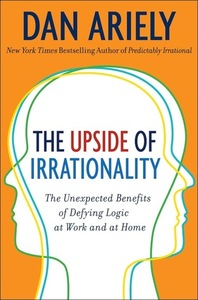Take a photo of a barcode or cover
59 reviews for:
The Upside of Irrationality: The Unexpected Benefits of Defying Logic at Work and at Home
Dan Ariely
59 reviews for:
The Upside of Irrationality: The Unexpected Benefits of Defying Logic at Work and at Home
Dan Ariely
challenging
funny
informative
medium-paced
informative
reflective
medium-paced
informative
slow-paced
I liked the title more than the contents. Will get black to it eventually.
challenging
hopeful
informative
inspiring
reflective
medium-paced
informative
reflective
medium-paced
A classic Dan Ariely book, phenomenal from start to finish.
There is no point in needlessly complimenting this book, this is one of those books which make you a smarter person in the end. Period.
Recommend!
There is no point in needlessly complimenting this book, this is one of those books which make you a smarter person in the end. Period.
Recommend!
Dan Ariely's writing style is a good balance of humor and hard data. This book was fun to read and genuinely interesting--debunking commonly held notions and the like. Counterintuitive and therefore, amuzing.
Like Predictably Irrational, this book is interesting and useful. It's also quite moving. Ariely connects his personal experience of being a burn victim (including an excruciating three-year hospital stay) to his research on such topics as pain endurance and assortative mating based on appearance. I appreciate how Ariely calls out the people who have done him wrong, from Audi's customer service to a fellow professor who scheduled makeup sessions during Ariely's own class times. Ariely also inveighs against the banking industry in his explanation of how big bonuses make people too frantic to work effectively (he was dismissed by industry leaders when he brought this research to their attention).
If you're a fan of the Freakanomics books, you will probably like this one.

